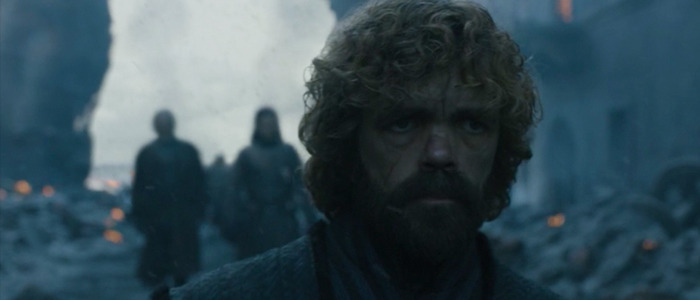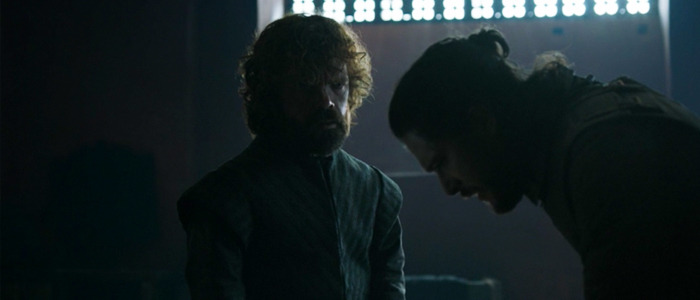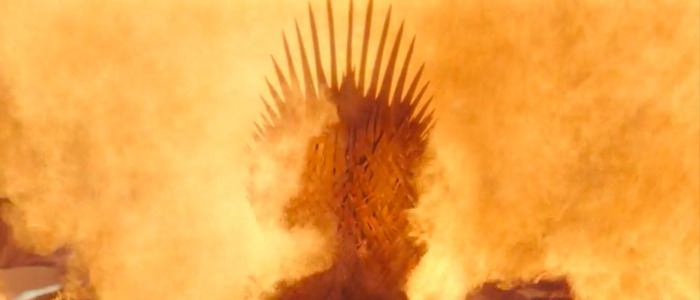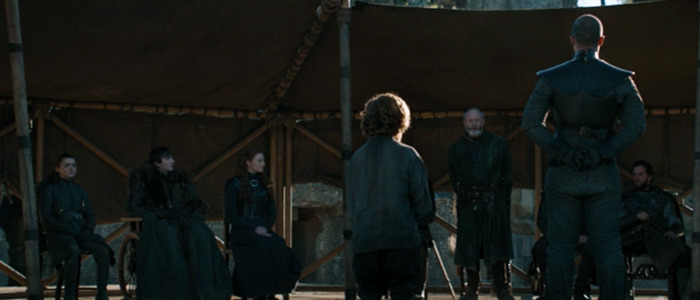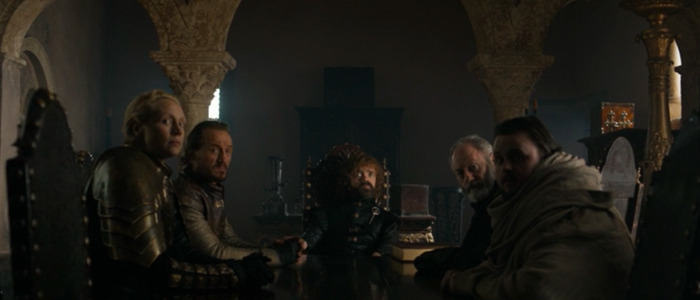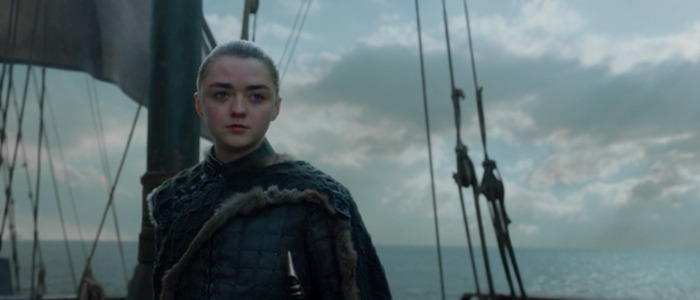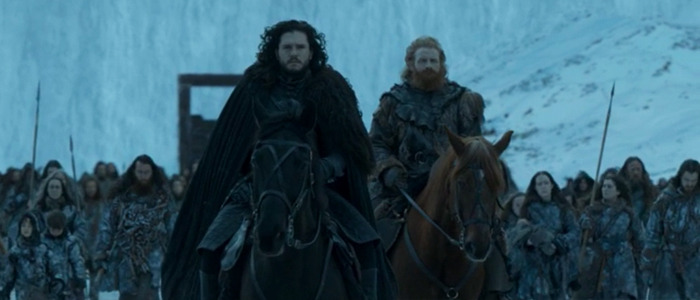'Game Of Thrones' Ends With Bloody Deaths, Bittersweet Victories, And A New Ruler
Game of Thrones is over. HBO's epic adaptation of A Song of Ice and Fire has reached its bittersweet conclusion with "The Iron Throne," a finale that will certainly keep tongues waggling for years to come.
So let's dive in. For the last time, /Film's resident Westeros experts Jacob Hall and Ben Pearson have gathered to break it all down.
The Aftermath
Jacob: After the carnage and chaos of last week's episode, I appreciated that "The Iron Throne" really allowed us to dwell on the silence of a destroyed King's Landing. Watching Tyrion and Jon walk through the ruins, the expressions of horror on their faces saying more than any words possibly could, was unsettling. How often do we see Tyrion Lannister at a loss for words? How often do we see Jon Snow looking unsettled? Daenerys' rampage will be a point of contention and conversation for years to come among viewers and fans and critics, but the response to the violence by the rest of the cast sold the horror of it all as well as any visual effect.
Let's linger on a few key moments. Most notably, the discovery of Cersei and Jaime's bodies by Tyrion, who weeps over the corpses of his beloved brother and hated sister. Unlike so many series finales, "The Iron Throne" never feels like it's in a rush, like it wants to sprint to the finish line. Instead, it pauses to tidy up business and remember the dead, friend and foe alike. Everyone knows Peter Dinklage is an incredible actor, but his wordless performance here is just as effective, if not more so, than his many speeches scattered throughout the rest of the episode.
And then there's Jon watching Grey Worm executing Lannister prisoners, unable to prevent it, and watching Daenerys make her victory speech. A speech promising more war, and even a return to Essos to finish the job she started earlier in the series. The speech walks a high wire – it manages to sound like the unhinged plan of a tyrannical lunatic while perfectly aligning with the Daenerys we have known (and yes, have loved and supported) for eight seasons. Jon's shellshocked impotence to do anything at first is us. He didn't see this coming any more than we did.
What did you think of these early scenes, Ben?
Ben: It definitely says a lot about the importance of last week's devastation that the showrunners chose to devote this much time to having their characters walk through the quiet of the aftermath. This wasn't just some run-of-the-mill spectacle, it was a character-defining act that will echo through the history books. Tyrion crying over his dead siblings was one of the episode's most moving moments for me, but I'm disappointed with the way the show handled Grey Worm's arc. I feel like the moment when he announces he's taking the Unsullied to Naath is meant to be a triumphant, almost redeeming conclusion for him, but it's tough to square that with seeing him ruthlessly slit the throats of surrendered soldiers. Maybe giving us a deeper look into his head could have made that sailing away moment land more powerfully, but that was one of the few moments in this episode that didn't really work for me.
Tyrion and Jon
Ben: "Everywhere she goes, evil men die and we cheer her for it," Tyrion explains to Jon. But Dany showed the world who she really was when she torched the innocent people of King's Landing, and though Jon saw the horrible effects of her decision up close last week, the guy still needed to hear Tyrion's macro assessment of the situation for the full scope to sink in. (Gotta love Jon saying he won't try to justify Dany's actions and then almost immediately trying to justify them anyway.) But when Tyrion turns things around and asks if Jon would have done the same thing, you can see the devastating realization of what he has to do start to flicker in his eyes. Jon can be boring and often pretty stupid, but one of his most important traits is how he always knows the difference between right and wrong. Jon may not be Ned Stark's son, but he was raised by Ned, and those values have enveloped him like a stylish wolf pelt.
"She believes her destiny is to build a better world for everyone. If you believe that...wouldn't you kill whoever stood between you and paradise?" Tyrion says. He's talking about Dany there, but he just as easily could have been talking about Stannis Baratheon, the man who burned his own daughter alive because of his own misguided thoughts about destiny. Jon has dealt with both of them, and Tyrion's question is one of the things that finally breaks through to him, and he slowly comes to grips with the idea that "sometimes, duty is the death of love" – literally, in this case.
Jacob, what did you think about this scene – especially the revelation that Tyrion says he's in love with Dany? I think some people suspected that since we saw him creeping around on that boat at the end of season seven, but I believe this is the first time he's said it out loud.
Jacob: I think this scene may be one of my favorites of not just the episode, but in the entire series. Jon and Tyrion have shared an unlikely rapport since the first episode, where they bonded over both belonging to the cripples, bastards, and broken things club. A noble drunkard from the west and a bastard from the north shouldn't have anything to talk about, but the years have shown that these two, despite having wildly different tastes, outlooks, and skill sets, are often more alike than they are different. They both overestimate the good in their allies, underestimate the evil in their enemies, and work hard to overcome their failings, even as they stumble. And boy, have they stumbled. But they've stumbled so far and this, their most important conversation in the entire series, finds them stumbling onto their most difficult decision yet.
So to more directly answer your question Ben: it makes sense that Tyrion would have affection for Daenerys. That's apparently a trait that runs in Lannister men, after all. Like Jaime, Tyrion has dedicated his life to an "evil" woman, one who would destroy him and the kingdom to achieve her goals. And since Jon has a habit of falling for women who shoot arrows into him or burn down cities with dragons, it's yet another trait they share. Two very different men, united by a shared soul. I found this all so lovely. And so very sad.
The Destruction of the Throne
Ben: I thought it was cool to hear Dany describe her initial imagining of the Iron Throne as being made of a thousand swords and stretching so high into the air you could only see the soles of Aegon's feet, because several years ago, George R.R. Martin shared artist Marc Simonetti's rendering which looks exactly the way she described. Martin called Simonetti's version "the real Iron Throne," and I'd encourage anyone who's never seen that concept art to click over and check it out.
The show's version of the throne was melted down to molten iron by Drogon's anger/frustration over his "mother's" death. In the end, Dany and Drogon ended up breaking the wheel after all, destroying the tyrannical symbol that's loomed over Westeros for three hundred years. Personally, I was glad to at least see the throne room wall take some of that dragon fire as well, because while the visual of a burning Iron Throne is compelling, the idea of Drogon focusing his rage on that single object doesn't make too much sense. But the series has earned a huge step into full-on metaphor territory by now, so it didn't really bother me.
Any thoughts on the throne's final moments, Jacob? If not, I'd love to hear your reaction to the time jump that happened right afterward, which may have been my biggest surprise of the episode. (Is winter really over in Westeros after just a few weeks?)
Jacob: I don't think winter is over at all! While I appreciate the time jump, I think winter is only just beginning – it's just not as obvious down in the south.
As for the scene itself, it's far more typical fantasy than we're used to from Game of Thrones, but at this point in the run, I'll allow it. I'll allow the tragic romance between Jon and Dany to reach its bloody end (complete with a gutted, literally and figuratively, Mother of Dragons) and I'll allow Drogon's vengeful throne destruction because someone had to do it, dragons are smarter than we give them credit for, and no human being was going to make such a momentous decision. Whether the melting of the Iron Throne was a side effect of Drogon mourning or a hint that this intelligent beast knew more about his mother's hopes and dreams than we could have imagined, I do not know. But I do know that in death, Daenerys did do what she set out to do: she broke the wheel.
Daenerys had to die after "The Bells." We knew it was coming and we knew it had to be Jon to do the deed. Of course, something being inevitable doesn't make it any less tragic, and as the death of Cersei showed, we're allowed to grieve for a monstrous character, especially one whose motivations and hopes are built on a truthful and honest foundation that we watched get constructed piece by piece for years. May Daenerys Stormborn of House Targaryen accomplish more as a memory than she did in life.
Choosing a King
Jacob: "The Iron Throne" isn't an especially funny episode of Game of Thrones, but I'll admit to chuckling pretty damn hard when noble and good-hearted Samwell Tarly suggests turning Westeros into a democracy and receives immediate scorn from every other noble at the meeting in the dragon pit. I guess Westeros just isn't ready for our 21st century ideals, huh?
Beyond that, this scene is exactly what I love about Game of Thrones down to its core. A group of interesting people with differing viewpoints gather in one spot and have it out. I loved Edmure Tully, finally free from a dungeon, feebly making his case to be the new king. I loved Yara Greyjoy's unwavering support for the late Daenerys. I loved Robin Arryn, present and unable/unwilling to add anything to the conversation. I even loved Tyrion's Don Draper-esque pitch for King Bran the Broken, recognizing that he's easily the least offensive choice of the bunch. And even though they didn't have much to do in the scene, I loved seeing Gendry, Brienne, and others simply present at the meeting – the minor players have moved up and maybe, just maybe, the world will be a better place with them calling the shots.
Of course, Tyrion is also arguing for his life and the life of Jon Snow, as both of them have been prisoners of Grey Worm and the Unsullied since the death of Daenerys. And while it feels unlikely, the new King Bran making his first order freeing Tyrion and making him Hand of the King so he can atone for his mistakes also feels right. Perhaps the hard left turn to get to that spot was a little convenient, but if anyone is allowed to make convenient decisions on this show, it's the guy with psychic powers who came all the way to this meeting because he already knew he was going to become king as part of Westeros' new pope-election-style kingsmoot.
What did you think of this scene, Ben? And specifically, what did you think of Sansa being a total boss and only voting for Bran if he would allow the North its independence? The Six Kingdoms definitely doesn't have the same ring to it.
Ben: Sansa shutting down Edmure Tully was the best. While I wish Sansa herself could have been elected Queen of the realm, her allegiance has always been to the North, so it wasn't too surprising to see her demand its independence. But King Bran? That did surprise me, and I'm honestly still not sure how I feel about it. Tyrion's line, "There's nothing in the world more powerful than a good story" feels slightly self-congratulatory for the show, but it's also true. And Bran is Westeros's memory, so while so many other kings and leaders fail to learn from the past, Bran won't make that same mistake. So yes, I think I'm talking myself into liking that decision – even if I'm a little confused about why Grey Worm would just stand by and allow this election to happen when he had to have known that it would result in him not getting the justice he thought he deserved.
I'm very curious about how the next few elections go down and if the sense of camaraderie between these noble houses remains intact, or if, as the intense results of Dany's fall fade into history's rear view mirror, the squabbling will eventually resume. But that's the cool part about this ending: Westeros is too sprawling for any definitive resolution. The story continues.
The New Council
Jacob: Ben, we've been writing and talking about Game of Thrones for so long that it should come as no surprise when I say this was my favorite scene of the episode. On one level, there's just the endorphin rush of seeing unlikely characters we love all in the same room, interacting and preparing for adventures we can only imagine. On the other, there's the idea that this crew is entirely wrong for a new Small Council to manage the Seven, er, Six Kingdoms...and perhaps that's why they're the perfect fit for the gig.
Tyrion, the Hand of the King who doesn't want to be Hand of the King. Davos, the Master of Ships who used to be a smuggler and a pirate. Bronn, the Master of Coin who earned his fortune by slitting throats and stabbing backs for the highest bidder. Samwell, the Grand Maester who wouldn't know how to navigate a sticky political situation if his life depended on it. And Ser Brienne, the Lord Commander of the Kingsguard who is also – gasp! – a woman. This ragtag group has an enormous task: they must rebuild a city, guide a kingdom through winter, and perhaps even track down a rogue dragon. Thankfully, King Bran (being escorted by Kingsguard knight Ser Podrick!) has a plan.
I wished this scene could have been longer. I only wanted to spend more time with this crew. I only wanted to listen to them bicker and debate and plot and plan and hopefully make the world a better place for millions of people across the Six Kingdoms. Perhaps that's the most surprising thing about the grand finale. For a show so often nihilistic, it ends with a note of optimism. Perhaps these are the right people for these jobs. Perhaps things are changing, slowly but surely. This scene is funny and moving and yes, fan service-y, but aren't all series finales required to be a little fan service-y?
Oh, and because I'm not sure where else we could fit it in: my "single tear down the cheek" moment of the episode came when newly minted Lord Commander of the Kingsguard Ser Brienne sat down to finish the Jaime Lannister chapter in that big book of histories, fleshing out his pitiful paragraph into two pages of noble acts. If anyone felt cheated by his sudden death last week, this scene surely completed the Jaime arc in a satisfying, if bittersweet way. Do you agree?
Ben: You loving that small council scene is incredibly on-brand. But it was a great scene, and the show's last chance to truly wipe the board clean and place new pieces onto it in the hopes of a successful evolution. Before Jon killed her, Dany spoke about creating a new world. Instead of birthing one through fire and blood, these disparate people are going to do the hard work of shaping a new world through policies and programs...and building a few new brothels, too.
Yes, Brienne filling in Jaime's pages in the Book of Brothers was so damn touching, and it served as one final "fuck you" to King Joffrey Baratheon, who made Jaime feel like garbage back in season 4 by taunting him. "Someone forgot to write down all your great deeds," the sniveling brat said back then. "There's still time," Jaime responded. While Tyrion Lannister's name wasn't mentioned in the show's version of A Song of Ice and Fire, Ser Brienne made sure to record Jaime's legacy so history will never forget him.
Stark Journeys
Ben: The parallel editing at the end really worked for me. I'm a sucker for this sort of thing when it's executed well, and I thought the suiting up montage and those matching shots were pretty damn terrific. These characters may not all be connected by blood, but they're still family, and I loved seeing them each go off to be their best selves.
With the army of the dead defeated, Jon and Tormund lead the Wildlings north of the Wall to reclaim their homeland. (And Ghost finally received the love he deserved after being dissed earlier this season!) Sansa Stark becomes Queen in the North, ready to serve her people wisely. And what is left in the world for the woman who killed the Night King? Nothing...well, not in the known world, anyway. Arya's was my favorite of the three endings, because her last moments mirrored her ending in the season four finale, where a young girl sailed off to Braavos not knowing what her future held. Martin has previously teased the ending of his novel series as being a "bittersweet" conclusion akin to Tolkien's The Lord of the Rings, but Arya's ending was giving me major Reepicheep vibes from C.S. Lewis's The Voyage of the Dawn Treader. Seeing her sail beyond the map to explore the edge of the world is as close to perfect as this show gets.
Jacob, were you pleased with how the show left these three characters?
Jacob: Although Game of Thrones has always been an ensemble show, this ending proved where its heart has always lay: with Jon, Sansa, and Arya. Ending the show with a montage of them preparing for new adventures is perfect. We can only imagine what Arya finds beyond the map, but we know she's become the adventurer she always wanted to be. We can only imagine how Sansa rules an independent North, but the daughter of Ned Stark and Catelyn Tully is armed with everything she needs to be a wise and worthy queen. We can only imagine what Jon finds beyond the Wall, but with Ghost, Tormund, and the Wildlings he saved when no one else would by his side, it has to be something resembling peace.
Bittersweet is the right word here, Ben. They're alive. They've won. They've lost. And they have a lot more to do. And we won't get to see it.
Final(e) Thoughts
Ben: As I said in last week's podcast conversation, the thing I wanted most from this finale was for an emotional and satisfying ending that did right by the show's characters – and for the most part, I think that's what we got. Of course I would have loved for there to have been more time in these last two seasons for the show to be able to explore some of its ideas and storylines without speeding through them, but setting that aside and judging this finale on its own terms, I came away largely satisfied. There were some clear missteps along the way, but overall, Game of Thrones was a tremendous piece of television storytelling. I'd encourage anyone with a nasty taste in their mouths about this last batch of episodes to revisit our piece ranking the show's best moments and be reminded of how many incredible scenes and images this show gave us. It's tough, maybe even impossible, to assess the show's legacy this soon after it's wrapped up, but as Tyrion said, "Ask me in ten years." This show surely won't be forgotten in 2029.
Jacob, it's been a blast covering the final season alongside you. I know in years past you've handled these episodic reviews by yourself, so I just want to take a minute to say thanks for having me along for the ride. Your writing has enriched my already-considerable appreciation for the show, and it's bittersweet to think that our watch has ended. Any closing thoughts?
Jacob: "Ask me in ten years" may be the most important line of dialogue in the finale. If Game of Thrones is about history (and as we saw, history books about the events of the series are already being written) and who lives to tell the stories that make up history, "The Iron Throne" provided an intentionally unsatisfying answer – people who are already getting the facts wrong. In ten years, are the facts fixed or do they get further transformed into a simplistic song of good and evil? I do not know. Victors write history, but history takes on a life of its own. We don't know where the story goes from here and we can only hope the right shepherds are in place to guide everything.
Of course, that line also feels like the showrunners winking at the audience. Much like how fandom seems to have chilled out in the years since Lost reached its divisive ending, I think they're just asking us to not rush to conclusions and to treasure the time we've had with this series. Even if it stumbled and even if it failed more often than we would have liked, this was the television event of the '10s. I've never encountered a pop culture phenomenon quite like it in my lifetime and I treasure every moment in retrospect, good and bad.
And honestly, Ben, after years of writing about the show solo, having you around for the final season has proven what any good ruler should know. You need to ally with the right people to get the job done. So, uh, see you for Watchmen in a few months?

